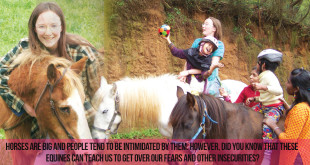Today, women are often suddenly awakened in the morning, to the ear-deafening honk of vehicles. They experience a spasm in the stomach as their minds shy away from the very thought of another day to pull through somehow! They are deeply conscious that there is really no one who cares about what happens as they face the pressures of this world!
In today’s jet age era, it is not unusual for our urban women from our metropolitan cities to start their day with this anxious feeling of abandonment within them. We can rightly wonder why they feel lonely, insecure and unhappy, even though they have acquired good education and have reached a good position that gives them a good salary.
In my professional life, I have met many such women from different strata of society, both married and unmarried; working and stay-at-home women. After much speculation on the matter, I came to the conclusion that somewhere inside a woman there is always a conflict in her mind and soul with regard to the dignity and respect given to her at home, her workplace and society in general.
What does “dignity” and “respect” mean?
Dignity is a position or excellence worthy of respect or self respect. The self-definition of dignity varies from person to person, class to class. But generally it can be said that it is related to how others feel, think and behave towards someone. Being treated with dignity and respect in society also enhances a woman’s self respect and self-worth, inspiring her to reach higher and be happy. The contrary situation, however, leads her into depression and low self-esteem. With the dual responsibility of keeping house and working outside, they are burdened with increased physical and emotional pressures to excel both at home and the workplace.
Dignity and Respect are key principles of the Human Rights Act. When a person’s dignity is compromised and no respect is given, it is an abuse a person’s human rights. The Constitution of India provides fundamental rights to the working woman under Articles 14, 19, 21, 32 and 42 of the Constitution of India. The Supreme Court of India in its judgment dated 13/8/1997 in the matter of Vishakha & Ors versus State of Rajasthan in Writ Petition (Criminal) No.666-70 of 1992 gave directions for implementation of guidelines in the case of sexual harassment of women at the workplace and other institutions. To protect women at home, in October 2006, the new law was implemented which is called: Protection of Women from Domestic Violence Act, 2006.
Self-oppression of the woman herself: Take the example of the single woman. No matter how successful she may be in her profession the social stigma and traditional taboos deprive her of the pride and delight she should feel in her success in her profession. How can a woman really live peacefully with self-respect and dignity when she has her own fears and complexes within her, caused by cynical remarks of other women, female colleagues and even her family?
This is the same for married women who suffer abuse in various forms from their husbands and in-laws. Though there are several laws to safeguard the dignity and respect of women at the workplace and at home, these are neither enough to create an environment of dignity and respect for a woman nor to prevent abuse, simply because she is a woman!
Even though single and married women do well in their professional lives, I find them lagging behind in their personal lives – more so if they are unmarried or divorced.
THE CHALLENGE
The big question is whether women, given legal protection, education and encouragement, are prepared to rise above their inner fears, and societal setbacks, to face the world with a new courage brought out by a new perception of themselves as having intrinsic value and tremendous potential to become true achievers. A Woman’s real power to rise above all negativity that tend to drag her down, actually lies within her!
– By Anjna Masih
Anjna Masih has done her L.L.B. from Campus Law Centre, Delhi University in 1995. She works as a Resource Person taking sessions on issues pertaining to the rights of women and children and other legal awareness programmes. Matrimonial Law and Civil Law are her fields of specialization. She is a Board member of ETANI and has attended the Advocates Asia Conference at Seoul and Singapore.
 Juliet Thomas Christian Articles for Young Women
Juliet Thomas Christian Articles for Young Women


